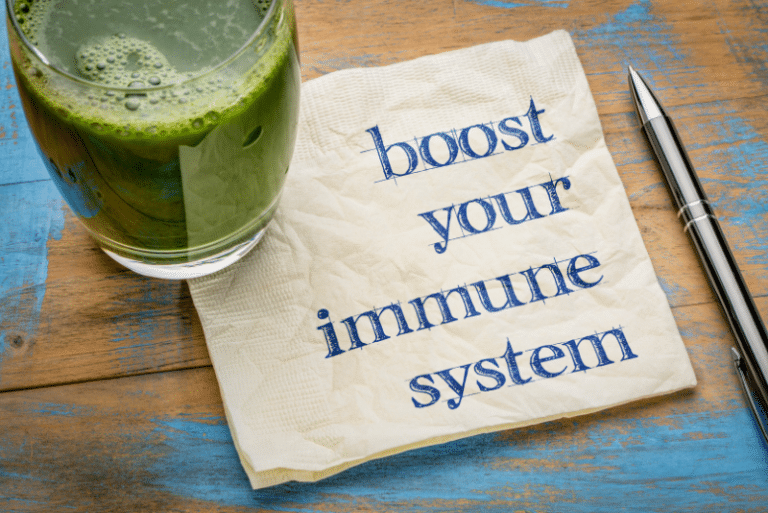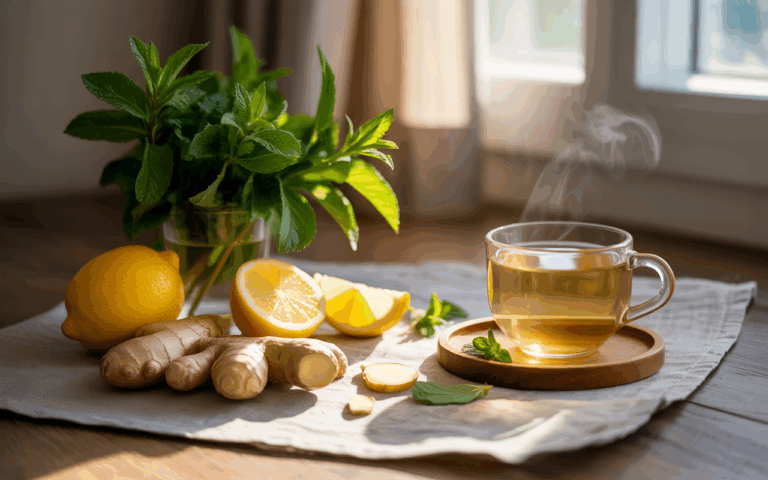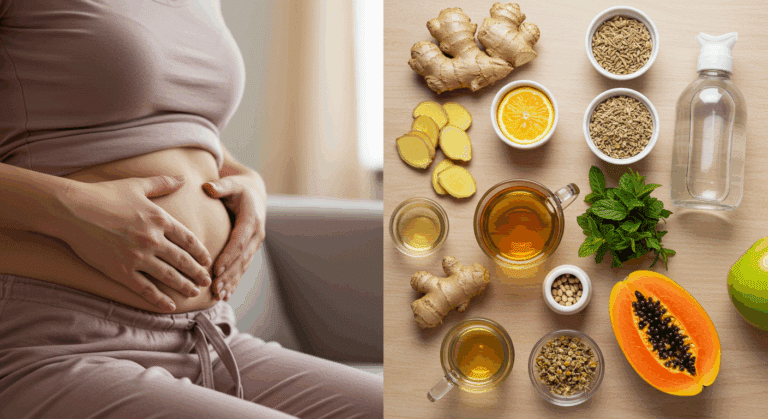Natural Home Remedies For Cold

When you catch a cold, natural home remedies can offer comforting relief and support your recovery. From herbal teas to immune-boosting supplements, there’s a wealth of options to explore. You might find that some familiar remedies hold surprising benefits. But do you know which ones are most effective? Let’s uncover some time-tested solutions that could make a difference in how you feel.
Effective Herbal Teas for Relief
When you’re battling a cold, which herbal teas can truly make a difference?
Lemon and honey tea can soothe your throat with vitamin C and antibacterial properties. Chamomile tea offers anti-inflammatory benefits, easing cough and nasal congestion. If you’re feeling feverish, ginger tea might be your best bet, as it reduces discomfort with its analgesic properties. Echinacea tea can stimulate your immune system and help manage cold symptoms, while garlic tea acts as a lung antiseptic, providing much-needed relief. Each of these herbal teas not only tastes great but also delivers essential support to your body as you recover, which promotes the elimination of cold. Staying hydrated with these herbal options can also help flush toxins from your system.
Immune-Boosting Supplements
To strengthen your immune system during the cold season, consider incorporating immune-boosting supplements into your routine.
Vitamin C, a powerful antioxidant, helps protect your cells and may shorten the duration of colds. A balanced diet is also important to ensure that your body can effectively utilize these supplements.
Zinc is essential for immune function and can reduce cold duration when taken as a lozenge.
Echinacea might boost your immune response, though results can vary.
Vitamin D is vital, especially if you’re deficient.
Elderberry may alleviate cold symptoms, while garlic offers antimicrobial benefits.
Probiotics support gut health, which is linked to immunity.
Finally, ginseng could help reduce your risk of colds.
Always consult a healthcare professional before starting any new supplement, especially if you have existing health conditions or are pregnant.
Cultural Remedies Around the World
As you explore ways to bolster your immune system during cold season, don’t overlook the rich tapestry of cultural remedies that have been passed down through generations.
In Mexico, garlic tea and cinnamon tea with honey offer antimicrobial and soothing effects. The Philippines swears by ginger tea for its pain-relieving properties, while various cultures utilize eucalyptus tea for its decongestant benefits. Additionally, Andrographis is known for its immunostimulatory properties, enhancing the body’s immune response during illness.
European traditions embrace elderberry tea, packed with vitamins. Comforting soups like chicken noodle soup and congee provide hydration and nutrition.
Unique treatments include blended radish and honey from the Dominican Republic for cough relief and foot baths in Cambodia to relax.
These remedies highlight the power of nature and tradition in supporting your health during illness.
Self-Care Practices for Recovery
While you may be enthusiastic to get back to your routine, prioritizing self-care practices can greatly enhance your recovery from a cold.
Start by staying home and getting plenty of rest; aim for 8 to 10 hours of sleep each night to help your immune system. Adequate sleep is crucial to boost immune function, so avoid overexertion and limit social interactions to prevent spreading illness. Additionally, drinking plenty of water helps to flush out bacteria from your system, which can be beneficial during illness.
Hydration is key—drink plenty of water and consume warm teas or broths to soothe your throat. Incorporate easy-to-digest foods like toast and oatmeal, and consider vitamin C-rich options.
Engage in relaxation techniques like meditation to reduce stress. Finally, use honey for cough relief and try steam inhalation to ease congestion.
These simple practices will support your healing journey.
When to Seek Medical Attention
Recognizing when to seek medical attention can be just as important as practicing self-care during your recovery from a cold.
If you experience any of the following symptoms, don’t hesitate to reach out to your healthcare provider:
- Critical Respiratory Symptoms: Severe shortness of breath, wheezing, or difficulty breathing.
- Severe Pain and Discomfort: Intense chest pain, severe headache, or persistent ear pain.
- Systemic Symptoms and Fever: Fever over 103°F (39.4°C), dizziness, or dehydration. Common colds typically last about seven to ten days, so if your symptoms persist beyond this timeframe, it’s important to consult a healthcare professional.
- Special Considerations for Vulnerable Groups: Fever in newborns over 100.4°F (38°C) or worsening symptoms in the elderly.
Prompt action can make a significant difference in your recovery, so trust your instincts when it comes to your health.
Frequently Asked Questions
Can Children Use Herbal Teas for Cold Relief?
Yes, children can use herbal teas for cold relief, but you should consult a doctor first. Choose age-appropriate teas, make certain they’re weaker than adult versions, and monitor for any allergic reactions or discomfort.
Are There Any Side Effects of Using Garlic Tea?
Yes, garlic tea can cause side effects like allergic reactions, digestive issues, bad odor, and skin irritation. If you’re on blood thinners or have sensitivities, it’s best to consult your doctor before consuming it.
How Often Should I Drink Lemon and Honey Tea?
You can drink lemon and honey tea as needed for relief. Many find it beneficial to have a cup in the morning and another at night, but feel free to sip throughout the day, too.
Can I Combine Different Herbal Remedies?
You can combine different herbal remedies, but be cautious. Always consider potential interactions and consult a professional for personalized guidance. Balancing herbs effectively enhances their benefits without risking adverse effects on your health.
Is It Safe to Use Essential Oils for Cold Symptoms?
Yes, it’s generally safe to use essential oils for cold symptoms if you dilute them properly. Just remember to test for allergies beforehand and avoid toxic oils around pets. They’re not a substitute for medical advice, though.
Conclusion
Incorporating natural home remedies for cold can help you feel better faster. Herbal teas, immune-boosting supplements, and cultural remedies offer effective relief, while self-care practices like rest and hydration support your recovery. Remember to listen to your body and seek medical attention if symptoms worsen or don’t improve. By taking these steps, you can soothe your symptoms and aid your healing process, allowing you to get back to your daily routine sooner.
References
- https://www.tuasaude.com/en/home-remedies-for-the-cold-and-flu/
- https://www.stamfordhealth.org/healthflash-blog/integrative-medicine/natural-remedies-cold-flu/
- https://www.elliothospital.org/about-us/newsroom/news/cold-and-flu-home-remedies-natural-treatments-and-when-seek-help-virtualer
- https://www.worldvision.org/health-news-stories/natural-cold-flu-remedies-world
- https://www.webmd.com/cold-and-flu/14-tips-prevent-colds-flu-1
- https://homesteadingfamily.com/herbal-cold-and-flu-tea/
- https://tucsontea.com/collections/cold-sore-throat-and-flu-wellness-wheel
- https://www.nvhealthlab.com/post/15-natural-remedies-to-combat-cold-and-flu-symptoms-the-health-lab-ultimate-guide
- https://www.herbsandkettles.com/blogs/blog/best-cold-and-flu-teas
- https://www.target.com/c/immune-system-supplements/cold-cough-or-flu-treatment/-/N-mx1mxZ9g16x






